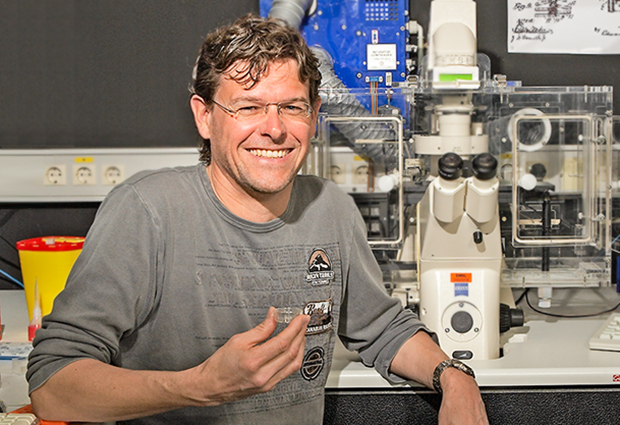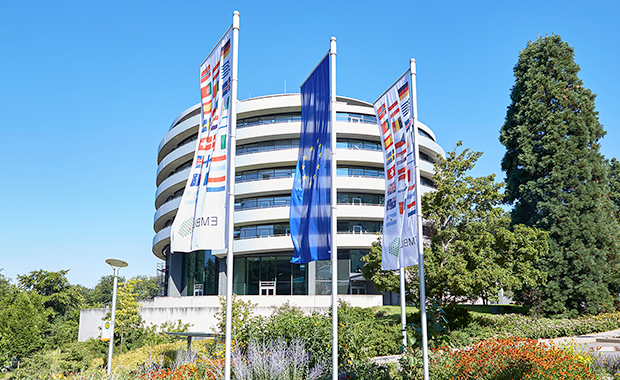
Political science
Alumni often return to EMBL for collaborations, conferences or community building. But twice a year former EMBL Heidelberg group leader Damian Brunner visits the Lab in a very special capacity – as a Swiss delegate on EMBL’s Council, discussing and voting on the Lab’s policy in scientific, technical and administrative areas. We caught up with Brunner, who is now a professor at the University of Zurich, to find out more.

How do you feel about your time serving as a delegate so far?
My first meeting was in Summer 2014 – it’s a great feeling to stay connected to EMBL and to be able to give something back to an organisation that has supported my career significantly.
What are your key roles and responsibilities?
Switzerland has two delegates on EMBL Council. As a “scientific” delegate, my main role is to advise our “political” delegate when scientific issues are discussed or voted on. However, one automatically takes part in political and financial discussions, too. Being an alumnus brings valuable experience, although delegates all differ from each other and bring with them a variety of skills.
What’s been the best experience?
I have already had a lot of exciting new experiences; it is difficult to single any out! However, one example that immediately springs to mind is the friendly atmosphere amongst delegates, even when there are some tough debates taking place during the meetings. Last summer, for instance, Switzerland played Argentina during the football World Cup and us Swiss happened to be placed right next to the Argentinean delegation. There was a lot of friendly banter between us. But of course Argentina won…
Scientists must actively lobby for support and, most importantly, freedom of science.
What’s the most significant thing that you have learned?
Politics is a major limiting factor for the success of science and scientists must actively lobby for support and, most importantly, freedom of science.
What advice would you give to someone interested in becoming more involved in science policy and politics?
As with any other goal: be proactive and invest brain time.
Can you describe some of the more challenging times?
The biggest challenge is to deal with situations where we have to implement clear instructions given by our government that do not necessarily represent our own opinion. I then find myself in a situation where I have to defend a decision that I do not really believe in, in discussions with my former EMBL colleagues and friends. In such situations, being a master of diplomacy is a very useful skill.
What are you working on in terms of research, now?
I am still trying to understand how cells can organise roughly the same set of ingredients in so many different ways. In particular, I am interested in the architecture of cells that generate the forces shaping an organism.
Could you describe some of your fondest memories of EMBL?
I recall a considerable number of wonderful people and countless inspirational scientific experiences. One special memory is the amazing leaving party our unit organised for the group of people that left to set up the Max Planck Institute for Molecular Cell Biology and Genetics in Dresden, immediately after I started working as EMBL group leader. Another is the continuous support I received from colleagues and EMBL’s administration when setting up my new lab here in Zürich.
Have you maintained a network of EMBLers since leaving the lab?
Yes of course! Manu, my wife, is an EMBLer too, and every year we go skiing for a week with several EMBLers. Many EMBLers have visited us in Zürich and I still closely collaborate with a number of present and former staff members, while another EMBLer, Christian von Mering, has his office just 10 metres away from mine. I am also very happy to still have regular contact with several of my former lab members.

Summer Council Meeting 2015
EMBL Council convened at the two-day meeting in Heidelberg on 30 June and 1 July, to discuss and vote on a large number of issues, including:
Senior appointments
Council approved two new senior appointments: Thomas Schneider (EMBL Hamburg) as Senior Scientist, and Christian Scherf as new EMBL Administrative Director – he will officially take up post in November 2015.
“Excellent” unit reviews
EMBL Hamburg, EMBL-EBI Services and the Developmental Biology Unit in Heidelberg all received very positive evaluations by the Scientific Advisory Council. The unit leaders and all their colleagues were thanked for their hard work and excellent performance.
Looking ahead
EMBL Council was presented with a summary of the new five-year EMBL Programme 2017–2021 and the corresponding draft Indicative Scheme that detail the plans and projected budgets of all EMBL activities, from research to outreach. A final decision is scheduled for November 2016.
Updates and reports
Council was updated, and impressed, with the considerable progress of ELIXIR and Euro-BioImaging in recent years. An annual update on EMBL’s Technology Transfer activities also demonstrated their ongoing excellent performance.
More:
– A series of changes to the pension scheme were adopted, with a view to guaranteeing self-sustainability.
– EMBL’s Annual Report 2014 was circulated and approved.
– New and re-appointments to the Scientific Advisory Committee were announced.
– The next Council meeting will take place in Rome on 24 and 25 November 2015.


